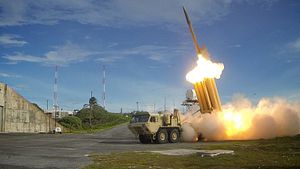Trans-Pacific View author Mercy Kuo regularly engages subject-matter experts, policy practitioners, and strategic thinkers across the globe for their diverse insights into U.S. Asia policy. This conversation with Soo Kim – contractor analyst and adviser at U.S. Customs and Border Protection, 2015 National Security Fellow at the Foundation for Defense of Democracies, and former intelligence officer at the Central Intelligence Agency, specializing in leadership intentions, nuclear proliferation, and propaganda analysis – is the 97th in “The Trans-Pacific View Insight Series.”
Explain the rationale behind South Korean President Moon Jae-in’s decision to temporarily suspend THAAD (Terminal High Altitude Area Defense) deployment.
Ostensibly, Moon’s decision to halt THAAD deployment is based on the rationale of environmental safety, transparency, and accountability to the South Korean public. His administration contends that the Ministry of National Defense failed to inform the incoming president on the arrival of four of the six launchers that are already in-country – which is difficult to fathom, as all THAAD batteries have six launchers. If we suppose that Moon was truly caught off-guard by this information, this just underscores his limited understanding of security and consequently adversely places his competency under question.
What’s actually going on is posturing. From a domestic and international standpoint, Moon’s presidency has yet to become stable. He is pressed to deliver on his promises to the South Korean public within a reasonable time. In Moon’s case, the timeframe might be truncated, as the circumstances in which he was elected to office were unique and abbreviated. Moon also appears to be more sensitive to China’s dissatisfaction with THAAD and willing to concede to Beijing’s economic pressure on Seoul – a factor of consideration that conflicts with the trajectory of the U.S.-South Korea alliance.
Explain the dynamic between domestic politics and geopolitics in Moon’s decision-making.
President Moon has been in office for just a little over a month now. His purported landslide victory notwithstanding, note that the May presidential by-election was a truncated election cycle – candidates had much less time to campaign, and more importantly, South Korean voters also decided on their leader in a short time span. Domestic political atmospherics in Seoul are still unsettled, and on top of this, South Korea has had to deal with an onslaught of North Korean provocations and China’s pressure. President Moon is pressed to prove his legitimacy as a transparent and accountable leader to the South Korean public while fending against the DPRK’s nuclear and missile tests and choosing a course of action that is perceived as being mindful of Beijing’s interests. Moon’s recent THAAD decision is demonstrative of the push-pull dynamic between domestic and geopolitical factors at play in his decision-making.
What is the impact of Moon’s decision on U.S.-ROK and ROK-China relations?
THAAD deployment is not just Seoul’s security preparation in the event of a North Korea attack – it also bears the symbolic significance of the United States and South Korea jointly working together against the common DPRK threat. If Moon follows through on his decision to delay THAAD deployment, this could not only create a vacuum in the ROK’s defensive capabilities against its northern neighbor; it could also strain U.S.-South Korea relations. Moon in his public statements has maintained that his intention for an environmental assessment on THAAD is neither to overturn the already-made decision nor to convey a “different” message to Washington – that Seoul is pivoting toward Beijing. But this is precisely the impression that he’s giving, especially in light of Beijing’s condemnation of THAAD and increasing chokehold on South Korean businesses and economic activities in China in an attempt to force Seoul’s acquiescence.
What signal does Moon’s move send to Pyongyang?
Moon’s decision to delay THAAD deployment suggests South Korea’s veil of a hardline approach toward Pyongyang may soon be lifted, bringing a redux of the former Roh administration’s pro-engagement policy. It downplays the gravity of the North Korea threat, conveying a message that the new Blue House does not take Pyongyang’s provocations to be a serious imposition on South Korea’s security and that of its regional neighbors. In so doing, Seoul is signaling a more conciliatory, pliant posture toward Pyongyang.
It’s worth noting, however, that the Kim Jong-un regime had anticipated this window of opportunity long before Moon came into office. In Seoul, the discovery of former president Park Geun-hye’s deep entrenchment in a corruption scandal created a leadership vacuum; in Washington, a new presidential administration quick to respond meant an easily provoked adversary. The stars are aligned for the Kim regime to extract as many concessions as possible from not only Seoul, but Washington and Beijing, as well.
Assess the consequences of THAAD’s termination on South Korea’s security policy and implications for U.S.-ROK relations.
THAAD’s termination sends a powerful yet undesirable message about South Korea’s security policy and prioritization of alliances. In creating a vacuum in Seoul’s defensive preparations against North Korea’s nuclear and missile threats, it perpetuates the perception of ROK vulnerability to the DPRK. In addition, the THAAD symbolizes a joint U.S.-South Korea resolve against a shared adversary – removing this emblematic defense system could thus send the message that Seoul no longer views Washington as its most important alliance partner. From a long-term security perspective, this makes South Korea more susceptible and vulnerable to North Korea’s incursions and provocations, as it essentially gives Pyongyang greater reign to force Seoul, no longer buttressed by its American ally, to make concessions and accommodate the DPRK.

































